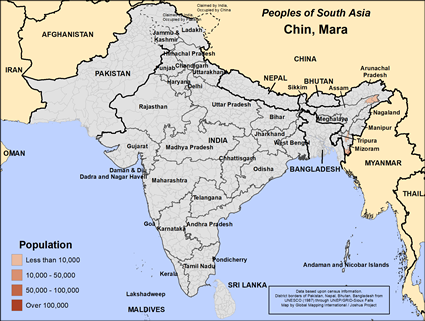Mara in India

Photo Source:
Joel Mang
|

Map Source:
People Group data: Omid. Map geography: UNESCO / GMI. Map Design: Joshua Project
|
| People Name: | Mara |
| Country: | India |
| 10/40 Window: | Yes |
| Population: | 44,000 |
| World Population: | 70,000 |
| Primary Language: | Mara |
| Primary Religion: | Christianity |
| Christian Adherents: | 99.32 % |
| Evangelicals: | 0.00 % |
| Scripture: | Complete Bible |
| Ministry Resources: | Yes |
| Jesus Film: | No |
| Audio Recordings: | Yes |
| People Cluster: | Kuki-Chin-Mizo (Zo) |
| Affinity Bloc: | Tibetan-Himalayan Peoples |
| Progress Level: |
|
Introduction / History
The Mara tribe is also known as the Lakher. Their homeland is in the southern part of Mizoram, India, and some live in parts of Myanmar's' Chin State. They have at least two subgroups as well.
What Are Their Lives Like?
The Maras were once slash-and-burn farmers, but many have transitioned toward a modern economy. Their literacy rate has increased, opening new opportunities for employment and higher pay. One can find them working in government offices, schools, universities, and running small businesses.
Community cooperation is central to Mara life; villagers commonly work together on agricultural projects and to build houses.
Their festivals blend traditional and Christian elements, and they almost always involve music, dance, and rituals. They celebrate the Lai Haraoba Festival, which honors local deities and spirits.
What Are Their Beliefs?
Though they blend Christianity with traditional religion, the Maras are officially Christian. They have a complete Bible and numerous gospel materials.
What Are Their Needs?
Maras need to decide whom to put their faith in. They have their traditional spirits, and they have Jesus Christ. They need to look only to the one who offers life to the full.
Those in rural areas often lack the medical care they need, particularly in emergencies.
Prayer Points
Pray for the work of the Mara Autonomous District Council to help them develop their economy and to have their needs met without interfering with the needs of others.